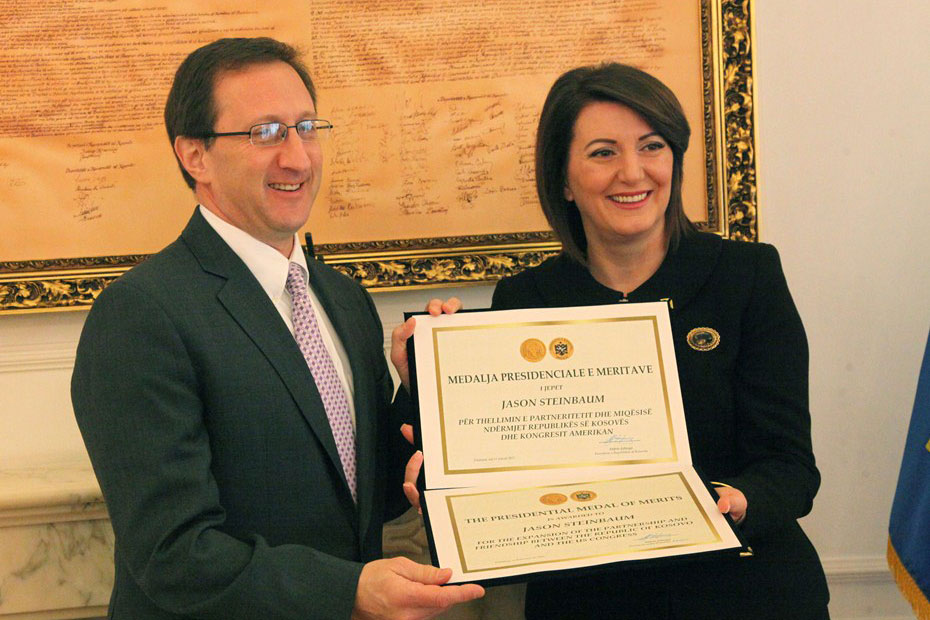Almost 5,000 miles from Charlottesville, graduates of two University of Virginia programs reunited for an awards ceremony in Pristina, Kosovo. One, Jason Steinbaum, was receiving a Presidential Medal of Merit for more than 20 years of activism on behalf of the young Republic of Kosovo. The other, Kosovo President Atifete Jahjaga, was the one bestowing the honor.
Jahjaga earned a postgraduate certification in criminal justice from UVA in 2007, one year before Kosovo declared independence from Serbia. Aided by that certification, she continued her rapid rise through the ranks of Kosovo’s police force and was elected president of the young republic on April 7, 2011. Jahjaga has traveled the world to encourage foreign powers to recognize Kosovo’s independence, which is accepted by more than 110 countries, including the United States, but remains opposed by key rivals like Serbia and its ally, Russia.
In the U.S., Jahjaga found an ally in Steinbaum, who graduated from UVA in 1988 with a degree in foreign affairs and is now the Democratic staff director for the House Foreign Affairs Committee.
“The president will be decorating Jason with the Presidential Medal of Merit for his special role and contribution in enhancing the relationship and cooperation between the Republic of Kosovo and the United States,” Vlora Citaku, Kosovo’s ambassador to the U.S., wrote in an email before the Feb. 17 ceremony. “Jason is a very familiar name in Kosovo for his tireless efforts to strengthen Kosovo’s international subjectivity and promote our rightful cause for equality under the sun.”
Steinbaum’s boss, U.S. Rep. Eliot Engel, is the ranking minority member of the Foreign Affairs Committee and represents a New York district with a large Kosovar and Albanian population. Steinbaum began advocating for Kosovo’s Albanian population, which was repressed under Serbian rule, almost immediately after joining Engel’s staff as a foreign affairs adviser in 1993.
At that time, Kosovo was a province of Serbia and the Federal Republic of Yugoslavia, ruled by president Slobodan Milošević, a socialist later indicated for war crimes committed in Kosovo, Bosnia and Croatia. After a short air war by NATO in 1999 to halt the expulsion of Kosovo’s citizens by Serbia’s armed forces, and a period under United Nations administration, Kosovo declared independence on Feb. 17, 2008.
Since that declaration, Steinbaum has been impressed with the country’s growth and with Jahjaga’s leadership after assuming to the presidency in 2011.
“She has been wonderful for Kosovo. She is respected in the international community and a great spokesperson for the country,” he said. “I discovered the UVA connection when preparing her bio for a meeting, and mentioned it to her. She loved it and would love to come back.”
Like Jahjaga, Steinbaum has been campaigning to help Kosovo earn recognition from more countries and to achieve membership in more international organizations.
“It has been the most fulfilling part of my work on Capitol Hill,” Steinbaum said. “The people I have worked with in Kosovo have such gratitude toward the United States and strongly support our work in their region.”
Steinbaum helped Kosovo reach a significant milestone in December, when the U.S. Millennium Challenge Corporation awarded Kosovo a compact that could result in millions of dollars of assistance in key efforts like improving infrastructure. Congress created the corporation in 2004 to deliver U.S. assistance to countries that demonstrated good policies, economic promise and a commitment to the rights of their people. The organization scores countries on numerous data points, such as economic growth or children’s health care and immunization.
Steinbaum had been working for years to turn the corporation’s attention to Kosovo, but was unsuccessful because it collects certain data from UN agencies in New York or Geneva. Because Kosovo is not a UN member state, key data was missing. Finally, Steinbaum worked with the corporation to allow a UN office in Kosovo to produce the data instead of the agencies’ headquarters. He knew staff at the UN Kosovo office and at the Millennium Challenge Corporationand facilitated the connection personally.
“I wanted MCC to find a way to allow Kosovo to compete fairly with other countries for its assistance programs,” Steinbaum said. “I had been working on this for years and it had been one of my greatest frustrations. Seeing the compact come through in December, that frustration turned into one of my happiest moments.”
Though the specifics of the compact are yet to be determined, Kosovo will likely benefit from tens of millions of dollars that will go directly toward improvements in sectors such as transportation, health care, education and energy.
Even with this assistance, there is still much Steinbaum hopes to accomplish in Kosovo.
“They have a tough road ahead,” he said. “Until they work out their differences with Serbia and Serbia recognizes them, they will be blocked from certain international institutions. They will need to fight for every step forward.”
Media Contact
Article Information
February 22, 2016
/content/alum-receives-medal-kosovo-president-who-also-attended-uva

